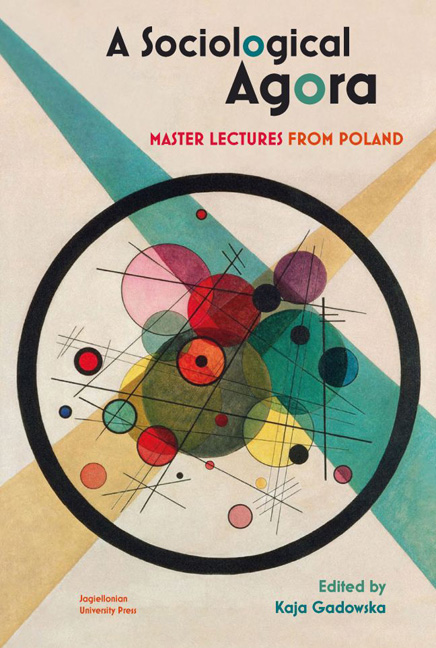Book contents
- Frontmatter
- Contents
- Society in a Time of Pandemia: Postmodern Problems from a Social and Humanistic Perspective
- Trust and Risk in the Time of Pandemia
- The Mythologized Populist Imagination, Carnival Rebellion, and the Fate of Liberal Democracy
- Applied Feminism: Women’s Rebellion and Identity
- On Law and its Interpretative Artifacts
- On Legal Nihilism Once More: Lessons from Poland
- Minima iuridica: Reflections on certain legal (un)obviousnesses
- Community—Meaning What?
- An Essay on Welfare: Problematic and Debatable Issues
- Sources of an Ecclesiastical System Success
- About the Authors
- About the Editor
- About the Translator
- Polish Sociological Association
Sources of an Ecclesiastical System Success
Published online by Cambridge University Press: 01 March 2024
- Frontmatter
- Contents
- Society in a Time of Pandemia: Postmodern Problems from a Social and Humanistic Perspective
- Trust and Risk in the Time of Pandemia
- The Mythologized Populist Imagination, Carnival Rebellion, and the Fate of Liberal Democracy
- Applied Feminism: Women’s Rebellion and Identity
- On Law and its Interpretative Artifacts
- On Legal Nihilism Once More: Lessons from Poland
- Minima iuridica: Reflections on certain legal (un)obviousnesses
- Community—Meaning What?
- An Essay on Welfare: Problematic and Debatable Issues
- Sources of an Ecclesiastical System Success
- About the Authors
- About the Editor
- About the Translator
- Polish Sociological Association
Summary
In his review of my book on the Roman Catholic Church system, Leszek Koczanowicz raised a question regarding the sources of success for what he called the “phantasmal bubble” of church Christianity. Encouraging me to undertake this topic in a subsequent work, Koczanowicz wrote then,
The history and analysis of Christianity recounted [in this volume] can be extrapolated with reference to all such systems—which are, of course, ubiquitous in the social world. Not all have been as lucky as Christianity to have conquered quite a bit of the world and lasted for two thousand years, but they have displayed similar mechanisms and similar ways of defending system cohesion. Hence one matter remains open, meaning an answer to the question of Christianity's success. How has it happened that a phantasmal bubble was capable of influencing the way of thinking two millennia ago?
In accord with the suggested line of inquiry, Beata Anna Polak and I have undertaken the challenge and are preparing a new treatise. The goal is to address this question about the criteria behind the success of the system of the church as well as similar systems organized around a phantasmic consciousness. The subject matter (as evident) is ponderous—just right for a book. Within the timeframe of a lecture, however, I can only point to the premises of our analysis, supplementing those with a few illustrative examples. This text, therefore, will merely serve as a sketch with a few roughhewn details.
In the work reviewed by Koczanowicz I had used Bertolt Brecht's Stories of Mr. Keuner as both an ironic and astute commentary accompanying my investigation. In our forthcoming volume, we have also decided to employ a Brechtian annotation. Breaking down the sources of this ecclesiastical system's success, we refer to “Mr. Keuner and his niece's drawing”: “Mr. Keuner looked at the drawing his little niece had made. It depicted a hen flying over a farmyard. ‘Tell me, why does your hen have three legs?’ asked Mr. Keuner. ‘Hens can't fly, of course,’ said the little artist, ‘and so I needed a third leg to give it a lift.’ ‘I’m glad I asked,’ said Mr. Keuner.”
- Type
- Chapter
- Information
- A Sociological AgoraMaster Lectures from Poland, pp. 181 - 194Publisher: Jagiellonian University PressPrint publication year: 2023



